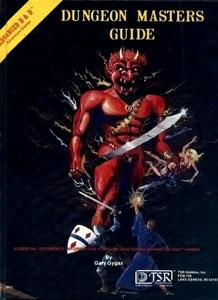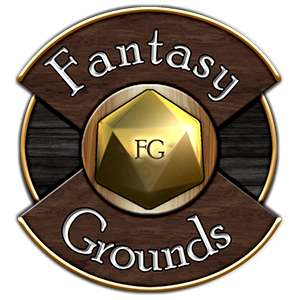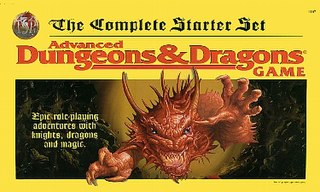
Dungeons & Dragons is a fantasy tabletop role-playing game (RPG) originally created and designed by Gary Gygax and Dave Arneson. The game was first published in 1974 by Tactical Studies Rules, Inc. (TSR). It has been published by Wizards of the Coast, later a subsidiary of Hasbro, since 1997. The game was derived from miniature wargames, with a variation of the 1971 game Chainmail serving as the initial rule system. D&D's publication is commonly recognized as the beginning of modern role-playing games and the role-playing game industry, and also deeply influenced video games, especially the role-playing video game genre.

Dragon is one of the two official magazines for source material for the Dungeons & Dragons role-playing game and associated products, along with Dungeon.

Wizards of the Coast LLC or Wizards) is an American publisher of games, most of which are based on fantasy and science-fiction themes, and formerly an operator of games retail stores. In 1999, toy manufacturer Hasbro acquired the company and currently operates it as a subsidiary. During a February 2021 reorganization of Hasbro, WotC became the lead part of a new division called "Wizards & Digital".

The Dungeon Master's Guide is a book of rules for the fantasy role-playing game Dungeons & Dragons. The Dungeon Master's Guide contains rules concerning the arbitration and administration of a game, and is intended for use by the game's Dungeon Master.
The Open Game License (OGL) is a public copyright license by Wizards of the Coast that may be used by tabletop role-playing game developers to grant permission to modify, copy, and redistribute some of the content designed for their games, notably game mechanics. However, they must share-alike copies and derivative works.

In the open gaming movement, a System Reference Document (SRD) is a reference for a role-playing game's mechanics licensed under a public copyright license to allow other publishers to make material compatible with that game. In 2000, Wizards of the Coast pioneered this by releasing a SRD for Dungeons & Dragons 3rd edition under their Open Game License (OGL).
Several different editions of the Dungeons & Dragons (D&D) fantasy role-playing game have been produced since 1974. The current publisher of D&D, Wizards of the Coast, produces new materials only for the most current edition of the game. However, many D&D fans continue to play older versions of the game and some third-party companies continue to publish materials compatible with these older editions.

Michael Mearls is an American writer and designer of fantasy role-playing games (RPGs) and related fiction.

The Pathfinder Roleplaying Game is a fantasy role-playing game (RPG) that was published in 2009 by Paizo Publishing. The first edition extends and modifies the System Reference Document (SRD) based on the revised 3rd edition Dungeons & Dragons (D&D) published by Wizards of the Coast under the Open Game License (OGL) and is intended to be backward-compatible with that edition.
The Old School Renaissance, Old School Revival, or OSR, is a play style movement in tabletop role-playing games which draws inspiration from the earliest days of tabletop RPGs in the 1970s, especially Dungeons & Dragons. It consists of a loose network or community of gamers and game designers who share an interest in a certain style of play and set of game design principles.

Hoard of the Dragon Queen is an adventure module for the 5th edition of the Dungeons & Dragons fantasy role-playing game. It is the first part of the Tyranny of Dragons storyline and followed by a second adventure, The Rise of Tiamat.

Roll20 is a website consisting of a set of tools for playing tabletop role-playing games, also referred to as a virtual tabletop, which can be used as an aid to playing in person or remotely online. The site was launched in 2012 after a successful Kickstarter campaign. The platform's goal is to provide an authentic tabletop experience that does not try to turn the game into a video game, but instead aids the game master in providing immersive tools online. The blank slate nature of the platform makes integrating a multitude of tabletop role-playing games possible.

Fantasy Grounds is a virtual tabletop application, which contains a set of tools to assist players of tabletop role-playing games playing either in person or remotely.

D&D Beyond (DDB) is the official digital toolset and game companion for Dungeons & Dragons fifth edition. DDB hosts online versions of the official Dungeons & Dragons fifth edition books, including rulebooks, adventures, and other supplements; it also provides digital tools like a character builder and digital character sheet, monster and spell listings that can be sorted and filtered, an encounter builder, and an interactive overlay Twitch Extension. In addition to the official D&D content available to purchase, it also provides the ability to create and add custom homebrew content.

The Dungeons & Dragons Starter Set is a category of companion accessories across multiple editions of the Dungeons & Dragons fantasy role-playing game. In general, the Starter Set is a boxed set that includes a set of instructions for basic play, a low level adventure module, pre-generated characters, and other tools to help new players get started.

Eberron: Rising from the Last War is a sourcebook that details the Eberron campaign setting for the 5th edition of the Dungeons & Dragons fantasy role-playing game. Jeremy Crawford, co-lead designer of the book, said the book "is the size of one of the core rule books of the game, it is jam packed".
Wolves of Freeport, formerly named OneBookShelf, is a digital marketplace company for both major and indie games, fiction and comics. In 2023, OneBookShelf merged with Roll20 to become Wolves of Freeport. OneBookShelf itself was formed by the merger of RPGNow and DriveThruRPG in 2006. The company's e-commerce platforms host content from individual sellers, indie creators and major publishing companies such as Chaosium, Fantasy Flight Games, White Wolf, and Wizards of the Coast.
A digital tabletop game is a video game genre that includes video games that have gameplay similar to physical tabletop games, including board games, card games, and role-playing games. Many digital tabletop games are adaptions of existing physical games into the video games, though some of these are wholly digital games that use tabletop game mechanics. There are also tabletop game simulators that allow for users to recreate tabletop games from a variety of game pieces.
Demiplane is a company that creates digital toolsets for playing tabletop role-playing games which can be used as an aid to playing in person or remotely online. The Demiplane platform's main services are game matchmaking, game hosting and licensed content via the Nexus digital toolset. Nexus provides access to digital rulebooks, adventures, and other supplements; it also provides digital tools like a character builder and character sheets. The platform was launched in 2020; early access to Nexus launched in 2021.















